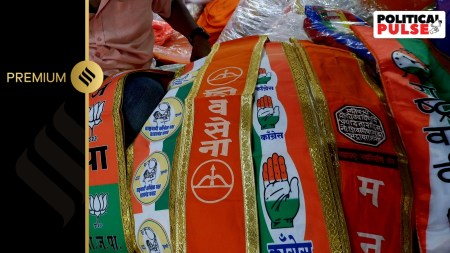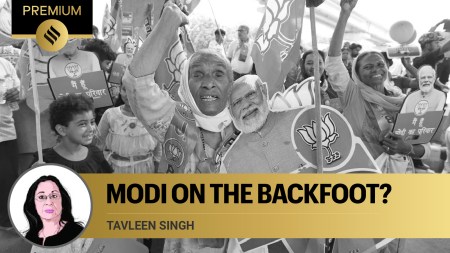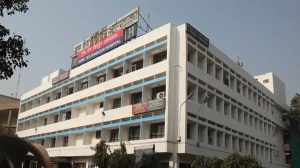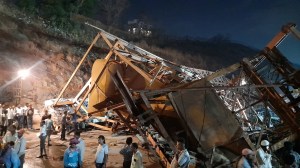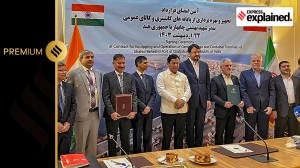- India
- International
What we did in 20 years we should have done in 10 years… We have been too slow: Montek Singh
Montek Singh Ahluwalia was Special Secretary in the PMO, Commerce Secretary, Economic Affairs Secretary, Finance Secretary, Member, Planning Commission, Director, Independent Evaluation Office, IMF, and Deputy Chairman, Planning Commission.
 Then Finance Secretary Montek Singh Ahluwalia with then Finance Minister Manmohan Singh at an editors’ conference in 1995. (Express Archive)
Then Finance Secretary Montek Singh Ahluwalia with then Finance Minister Manmohan Singh at an editors’ conference in 1995. (Express Archive)
In 1990, a document from the government which listed out a string of reform measures across sectors was leaked and found its way to the press, after which there were denials by the V P Singh government, which was struggling to survive politically. It turned out that the author of the document was Montek Singh Ahluwalia, who was working then with Singh in the Prime Minister’s Office. The document came to be dubbed as the “M Document”. When the P V Narasimha Rao government took over in June 1991, Ahluwalia, as Commerce Secretary, was part of the key economic policymaking team that started with trade reforms in the Commerce Ministry. Subsequently, as Finance Secretary, he worked with Finance Ministers Dr Manmohan Singh, P Chidambaram and Yashwant Sinha, with one of the longest stints in the post before heading to the International Monetary Fund as the first chief of its Independent Evaluation Office. He returned to India after the UPA government headed by Manmohan Singh came to office in 2004, and was appointed Deputy Chairman, Planning Commission, a position that he retained until 2014.
In an interview to The Indian Express, Ahluwalia, who worked as a young professional in the World Bank before returning to the country early on his career, says that one of the biggest challenges over the next few decades would be urbanisation — and worries about the notable absence of change on the administrative reforms and labour reforms fronts.
[related-post]
Watch Video: What’s making news
Having been an integral part of economic policymaking over the last 25 years, how do you look back, and view the changes?
There is absolutely no doubt in my mind about what was done — there were many things that had to be done — but in 1991, some very critical constraints were comprehensively removed over a two- or three-year period, and in some other areas, a process of reform was initiated. Part of the problem is that there is a national kind of a consensus for gradualism. I am also in favour of gradualism, not big bang. But in my view, what we did in 20 years we should have done in 10 years. That would have been gradualism. But we have been too slow.Then you must ask the question, why have we been too slow? Some people say that we started all these only because of the crisis, and once the crisis was over, you slowed down. Some people argue that, and critics of the previous government would blame it on Congress ideology, povertarianism. But this government is also into povertarianism. But the question arises — basically, I think if the system starts delivering 6 to 7% growth, and during the UPA [rule], it went up [to] almost 8% briefly and then came down, then the urgency of change is somehow less. Unless you recognise that you really need 8% growth. 6 to 7% is not good enough. One change is very obvious — we are not generating enough good quality jobs. Failure to generate quality employment is a key point. The analysis for that is also evident — labour reforms is important. But both the Congress government and the Modi government have decided that this will only be done with the consent of the unions.
You were Commerce Secretary in July 1991, when trade reforms were launched. That was inevitable then, and had to be done, wasn’t it?

Some economists in government were not in favour then. I had said much earlier in a document [which, after a leak, was called the ‘M document’] that was brought when I was with the V P Singh government in the Prime Minister’s Office, that this was the way to go. It highlighted the role of the exchange rate, and the export import scrips or Exim scrips was part of it. Rangarajan was supportive of this, but the Ministry of Finance was against it at the point of time when it was first suggested. But when P Chidambaram took over as Commerce Minister, he grasped it. Let us use this opportunity, we thought, and he took the ball and ran.
How was the level of political support then?
Frankly, a huge amount of credit should go to (Prime Minister) P V Narasimha Rao. He wanted to know whether the Finance Minister (Manmohan Singh) had agreed. There was no system like the Group of Ministers. Rao did a fantastic job. He delegated responsibilities, and people felt emboldened.
What have been the failures over this period?
One of the widely regarded reasons for the failure of reforms is that there has been no administrative reforms, and Shankar Acharya has written on that. One of the big missing things in previous governments and in this government is that there are no administrative reforms. We have a huge report by Veerappa Moily, the Second Administrative Reforms Commission report, and UPA in a way took pride in the fact that it had initiated it. But the question is, what has been done? Why does this happen?
You talk of the reform of the administrative system in India. But elsewhere, we have lateral entry, which is encouraged.
You see, in the British system, you join the treasury as a civil servant. You don’t join the service and go all over the place. Early on in life you are told you are a treasury man. Then, from the treasury, you can be sent out to other things. You don’t have a system like that here. One of the reasons we don’t have a system like that here is that we have a cadre-based IAS, from where you draw to the Centre. You must ask yourself, is that sensible? Maybe the Centre should have its own more or less permanent civil service, and for 30% of the jobs they should bring from the states in order to give those guys some experience. But the IAS is not happy with that at all. You asked about a broad-based selection process. Then all these interest groups come together.
The other challenge is in terms of identifying and appointing the right people for the right jobs. Why is that so difficult?
We seem to be putting people in complex jobs without expertise. How is the country going to run? The country is becoming more and more complex. And it is not a question of just getting quality people. The world is run on the basis of average quality, but with dedication. A Finance Secretary can be effective only if he has gone through two cycles. I remember, when I was Finance Secretary, I said, look we are going to select the chairman of LIC, and before we do the choosing, I want some broad principles established. So, I told the head of the civil service that let’s have some principles. One was that nobody with less than two years will be considered. Anybody who comes in will have at least two years. Then they said, of course, that’s understood. Then I told them that by the way, if you agree with this principle, out of the top 13, 11 will be disqualified. The point I am making is that you must thin the system. In the rest of the world, what happens is that when somebody gets chosen, the guys who are superseded just leave. If they are any good, they get into other jobs. The trouble with government jobs is that nobody else wants a government-type person. Well, I have a solution. And which is that every time somebody is superseded, he gets the same salary as the guy who supersedes him, but doesn’t get the post and doesn’t have to resign. You can tell your children that you have got a promotion in your grade but did not get the job. If you are not willing to do that, just leave.
People don’t realise that in the Army, there is a phenomenal thinning. The civil service is not thinning at all. I recently asked a young man why the stock price of one private bank was surging when all other public sector banks were sliding, and why there wasn’t a contagion effect. And his answer was that people look at the promoter CEO of that bank, know he is good, and that he will be there for 15 years. In other banks, the chap may be good but he would be there for maybe only one and a half years. So how does it matter, they say. Most people in government will say that this is a fair point, but will then say, we can’t do it.
Over the next 25 years, what should be high on the agenda?
Over the last few years, we have seen the public private partnership model in progress. And we have seen some major projects built on that basis. That is a way to go. More than anything else, we need to focus on our cities and the challenges of urbanisation. That’s much more important.
More Explained
EXPRESS OPINION
May 14: Latest News
- 01
- 02
- 03
- 04
- 05


